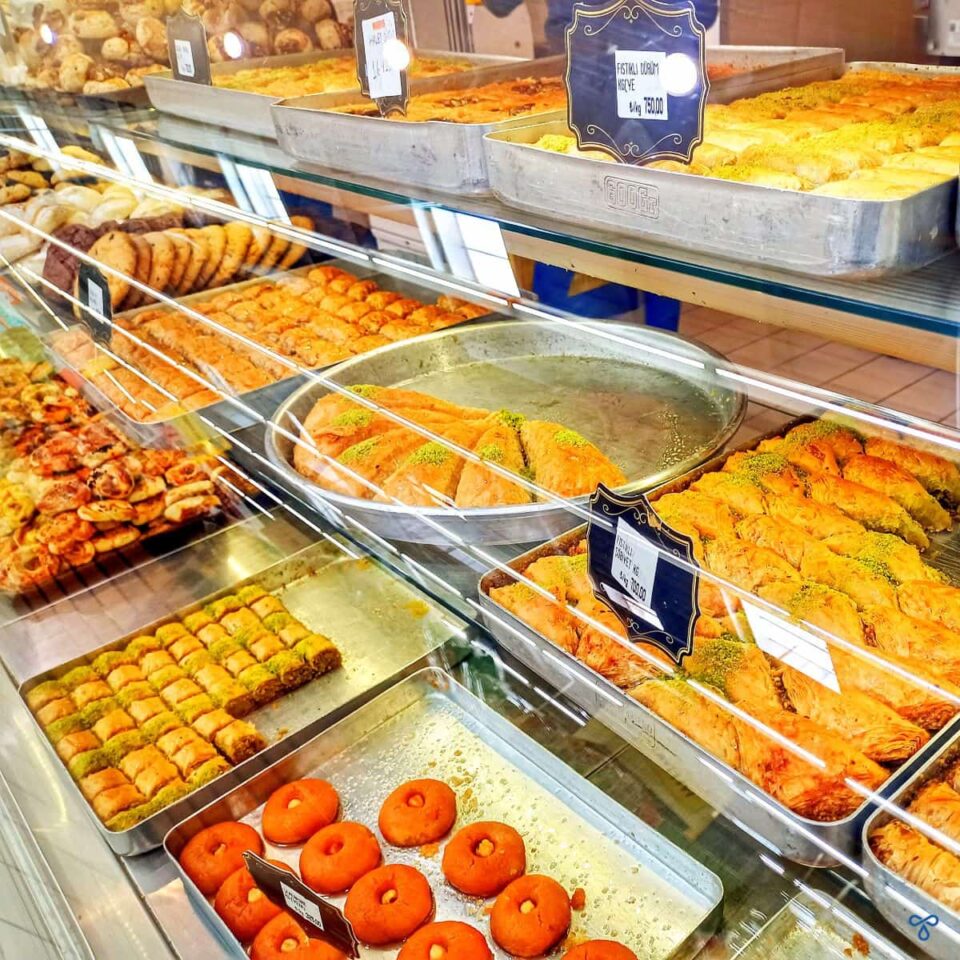Probably the most famous of all the famous Turkish sweets, there aren’t many people who don’t know about the special and much loved one dessert, baklava.


What is Baklava?
Baklava is a delicious dessert – if you still have plenty of room after eating, of course!
If you want to really appreciate the flavors and textures of baklava, it may be best enjoyed as a sweet snack in its own right.
Layers and layers
Layer upon layer of phyllo sheets: each individual hand-rolled layer is so thin it becomes translucent.
It’s an art.
Its artisans are trained and guided by the usta (master of their craft) until they become experts in their craft.
Made on large trays, each sheet of filo pastry is tossed with melted butter and oil before the next layer is carefully placed on top.
And then we get a peanut mixture filling before adding more layers of that oh-so-delicate filo pastry, brushed with melted butter.
Once the layering process is complete, the baklava is ready to be placed in the oven to cook.
Different shapes
But not before cutting it into slices with a very sharp knife before serving.



Baklava is generally cut rhombus OR diamond shapes, triangles OR squares AND rectangles.
But as a treat, we also love circular baklava, a phyllo dough “cake”, cut into large triangular slices. Carrot sliced baklava (carrot-shaped slices).
Pure indulgence!
Once golden, remove from the oven. And this is where sweetness enters the room.
Because the hot syrup is then poured over the hot baklava and left to sit for a couple of hours or so to reach room temperature.
Our first encounter with Baklava
I remember the first time we came to Fethiye on holiday and saw (and tasted) baklava for the first time.
For this savory food-loving couple, there was a lot to take in.
Baklava would become an acquired taste, and looking back now, it wasn’t the best example of this famous dish. Not all baklava is the same!
But we got there in the end.
We won’t say it’s a fixed dish on the menu at our house. But, these days, a strange piece after a meal at a local restaurant is a naughty but nice treat.
And even better if it’s warm and served with a scoop of ice cream or kaymak (a thick Turkish clotted cream).
It doesn’t matter if we do!



Easy with syrup
For us, syrup is the key ingredient.
Too much syrup and you might end up eating heavy, soggy baklava.
But a fresh Antep pistachio baklava with just a light syrup – so that the nutty and buttery flavor takes precedence and the flaky layers maintain a light crunch – perfect!
It’s a kuru baklava (dry baklava) which is our personal preference. Or an özel kare baklava (more oil, less sugar) – not too sweet for our palates!
Baklava far and wide
Not just a Turkish dish, of course.
Its exact origins are hotly debated and are not a discussion for this blog. Food historians have done just that!
For us it is one of those special dishes that unites and unites rather than divides.
In addition to Turkish cuisine, baklava variations form an important part of it Greek cuisine AND countries in the Balkans, the Caucasus and the Middle East.
Although variations exist between countries, Turkish and Greek baklava have regional differencesas well.
And why not? Use locally available ingredients.
Hazelnuts grow in Black Sea regions of Türkiye. So you will find baklava with hazelnut filling – hazelnut baklava – There.



In Bursa, chestnuts (kestane) prevail. AS Baklava with chestnuts it is famous for the city.
On Aegean coastyou might find almond (baklava with almonds) OR walnut (baklava with walnuts).
But the most famous Turkish variant is certainly the Gaziantep pistachio baklava (pistachio baklava).
Such an important feature of Turkish cuisine, Gaziantep Baklavası was the first Turkish product to receive the Protected Geographical Indication from the European Commission.
We have yet to visit Gaziantep but, of course, in addition to all the other famous dishes of the province – Gaziantep is a UNESCO City of Gastronomy – we will indulge in the pistachio-filled crunch of the crunchy, flaky filo pastry once we get there!
And there are also variations that create the sweetness of baklava.
From a sweet honey syrup to a simple sugar syrup; from to syrup infused with rose water in Iran a orange flower water syrup in Syria.
When is baklava eaten?
Especially in tourist areas, this pastry treat is often found on the dessert menu of restaurants.
Throughout the country, however, it often makes an appearance on special occasions.
The Baklava procession
It is often eaten during the holy month of Ramazan and Ramazan Bayramı, for example.
THE Baklava procession it was started by the Sultan Suleiman the Magnificent in the 16th century.
On the fifteenth day of Ramadan every year, the kitchens of Topkapi Palace rolled and cooked tray after tray of baklava and it was ceremoniously presented to the Janissaries as a gift.



If Turkish families have visitors, this special sweet phyllo dough is sometimes served to guests with çay or Turkish coffee.
And if you’re invited to someone’s home for a meal, a gift box of baklava is always a gracious offering to bring along.
Most places that specialize in making baklava will have attractive gift boxes for you to choose from.
You can then mix and match different shaped baklava or different nuts in the filling and on top of the baklava.
Homemade Baklava
Since the best baklava is made by the baklava masters out there — and since we don’t have that sweet tooth that makes us crave desserts like this — we have yet to attempt a homemade baklava recipe.
But we will…one day…
Share this article

